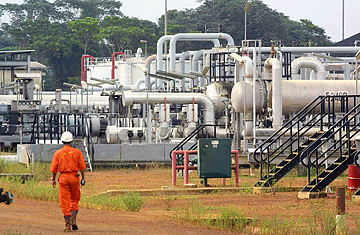
An oil plant in Gabon.
Improbable as it may seem, this unprepossessing town of moldy red-tiled villas surrounded by virgin tropical forest and white-sand beaches was named, a few years ago, as the world's most expensive city. With a bunch of carrots selling for $10, a box of eggs fetching $13 and rent on a medium-sized house touching $6,000 a month, it's still comfortably in the top 10. The reason? Port Gentil is a ville petrolier, an oil town that has drawn rig workers and executives from places as far away as Texas, Aberdeen and Caracas to earn fortunes pumping Gabon's oil reserves — and spend it like there's no tomorrow.
The sheer volume of cash sloshing around Port Gentil's streets lends them an unreal atmosphere. At the dump on the edge of town, Gabonese boys sort through trash in search of something to eat. But walk into any downtown cafe, and $400 will get you a bottle of 1999 St Emilion Premier Cru Bordeaux. The handful of paved streets are scarred with potholes the size of small swimming pools, but they are jammed with new top-of-the-range SUVs. Excursions on offer include tours of the jungle on giant-engine trail bikes or tours of the coast in giant-engine speedboats. And money and hydrocarbons meet in delicious symphony at one of Port Gentil's smartest restaurants, San Lorenzo, whose $30 special is currently "fresh tuna in oil." The manager, Ludovic, a trim 25-year-old Frenchman who was born in Port Gentil and returned to open a restaurant after cleaning up as a model in Paris, is candid about the effect his home town can have on your sanity. "Almost everything costs in Port Gentil," he grins. "But madness — that comes gratuit."
That's view is shared by Emile Gorayeb, whose family owns half the town's restaurants, hotels, casinos and nightclubs. Born in Madagascar, Gorayeb was once a petrolier himself, at a refinery in France. But what brought him to Port Gentil was not oil. Instead, at the edge of town, he built a sanctuary for gorillas, chimpanzees, wild pigs, deer and other animals rescued from hunter traps or injured on the roads. His self-financed foundation is part scientific institute, part environmental lobby, part zoo. His latest project is to have Port Gentil's schoolchildren plant thousands of palm trees around town. If his oil industry friends thought he was crazy before, he confides, they now openly refer to him as Deng Deng, a term from the local Fang language that loosely translates as "Hot Brains."
Gorayeb certainly becomes quite feverish when he talks of how robbers broke into his cages and slaughtered his animals. ("I cried, oh, I cried."). He's just as animated discussing Port Gentil's future. "If there's a big sea or even a lot of rain today, Port Gentil floods for days," he says. "This town is built on sand — there's no soil — and it's almost underwater already. I used to have a bungalow on the beach. Today, the sea has taken the beach, all 200 meters of it, and the bungalow. If we get hit by a hurricane, it's bye-bye Port Gentil." He has relayed his concerns to the petroliers, "and they know full well that some of the blame for global warming, disturbed weather patterns and rising sea levels is theirs." But except for a single firm funding a study of Gabon's environment, they confine themselves to hearing out Hot Brains, then politely showing him the door. "This town is being eaten by the sea," says Gorayeb. "Just saying 'Hello, bye-bye' is not enough any more."
I leave Gorayeb and take the short drive to the airport. In the main hall, a series of departure boards list oil company charters arriving and leaving every five minutes during the morning and evening rush hour. Hello, bye-bye.
